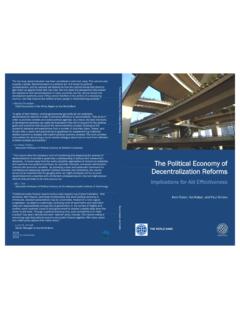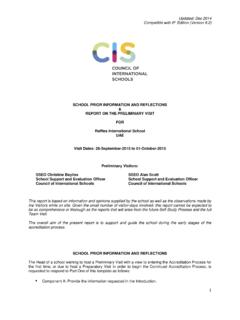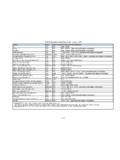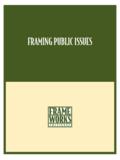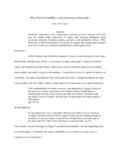Transcription of IMPLEMENTATION OF EDUCATION REFORMS IN …
1 1 implementation of education reforms in MAURITIUS Setting the scene EDUCATION , it is agreed today, has the function to reform and transform society instead of maintaining the status quo. It is thus its underlying responsibility to promote social justice specifically in schools and more generally, and through the spin-off factor, in society at large. In this connection, the world of EDUCATION and training rests on the major assumptions that political and social participation, and self-fulfilment are inherent to the kind of instruction and knowledge being transmitted.
2 At its heart therefore lies the inculcation of the notion of democratic rights and responsibilities, respect for Human Rights, Accountability and Ethical behaviour. At a more pragmatic and down-to-earth level, there are other issues that need to be considered, of which the following are central: Attending to differences in gender, race, social class, and ability, that result in political, social, economic, and educational disadvantage and inequality; Environmental and ecological concerns; School leadership and the teaching/learning process; The development of critical thinking and problem-solving attitudes; Inclusiveness in EDUCATION , such that the needs of not only those with special needs but also the talented are catered for.
3 With around million people living in the Republic of Mauritius with few natural resources, Mauritians know that to survive and prosper, they must make themselves relevant to the world and provide services and products which are required by the international community. Undoubtedly, the key to value-added is an internationally benchmarked quality EDUCATION and training. We believe that a good EDUCATION system is the key to maximize the talents and potential of our population and to give our people the means to support themselves and build a better life for themselves and their children.
4 It must be stated, however, that not only have all successive governments emphasised the centrality of EDUCATION as a primary driver of development but also that the successive transitions in the economy have dictated the type of EDUCATION to be provided to the population. In fact, if the first level of development in Mauritius in the 60s and early 70s threw into relief the need for basic EDUCATION and functional literacy and numeracy for all, today, as the country surfs on the third wave of economic and technological expansion with the identification of new niche areas, the conditions for success have changed drastically.
5 Indeed, after analysing the difficulties being faced by our textile industries and sugar factories, everyone agrees that our country needs to rethink its development to meet the new daunting challenges. The future competitiveness of the Mauritian economy is challenged by the erosion of the trade preferences and the emergence of low-cost competitors like China and India. According to the International Monetary Fund Mauritius is one of the economies that are most vulnerable to a fall in export revenues following the phasing out of trade preference treatments.
6 Therefore, in order to have sustainable economic growth, Mauritius will need to explore other areas of development. The suggested potential areas of opportunity like ICT, Financial services,.. require skilled human resources. Therefore, we cannot afford to waste our human resources. 2 In the Mauritian context, it is all the more accepted today that the EDUCATION sector will be called upon to supply the human capital required for higher value-added, more innovative knowledge - and skill-intensive activities .These would serve to unlock the knowledge-based future and transform Mauritius into a Knowledge Hub.
7 The Development of the EDUCATION System The Mauritian EDUCATION system had for long been shaped by primarily private enterprise with the role of Government being reduced, even insignificant to a large extent. Inevitably, inequalities presented themselves and this provided the impetus for free primary EDUCATION for all (the 40s) and, after independence in 1968, this resulted in an expansive primary-school building programme that would extend free primary EDUCATION to all Mauritian children. Mauritius has accordingly, and since then, witnessed an evolution from a small-scale primarily private enterprise to a large-scale, national, publicly-funded EDUCATION system, an evolution largely due to the high social demand for EDUCATION following the economic prosperity of the 60s and 70s.
8 In fact, as stated earlier, successive Governments set for themselves the task of placing a premium on EDUCATION in their overall development policy for the sustainability of social and economic development of the country. This policy was translated in investment in the country s human resources. Several Commissions of Enquiry and various reports accordingly made recommendations for an EDUCATION system more responsive to the systematically emerging needs of society. This culminated in a landmark development in EDUCATION in two watershed years, namely 1977 when EDUCATION became free at the secondary level and the amendment of the EDUCATION Act in 2005 to make EDUCATION compulsory till the age of 16.
9 It is vital to note that formal EDUCATION at all levels is governed by the EDUCATION Regulations of 1957 and the EDUCATION Act of 1982 and their various amendments. Since then, all efforts have been geared towards not simply adapting the EDUCATION system according to the needs of society but also aligning it with both regional and international practices and directions as witnessed by Mauritius being committed to achieving the Millennium Development Goals (MDGs), the EDUCATION For All (EFA) Goals and the Commonwealth EDUCATION Goals as well as the policies encapsulated in the UN Decade for Sustainable EDUCATION and Environment.
10 In the wake of the Jomtien EDUCATION for All world conference in 1990, and in line with its recommendations for each country to develop an Action Plan for EDUCATION based not only on facts and figures, but clear objectives and realistic goals, accompanied by a well-planned strategy to achieve these goals and objectives, the Ministry of EDUCATION produced a Master Plan on EDUCATION in 1991, which was not only used to guide REFORMS in Mauritius at that time, but was considered by the Donor Community (at that time) as a model plan upon which to base similar plans for the developing world.





